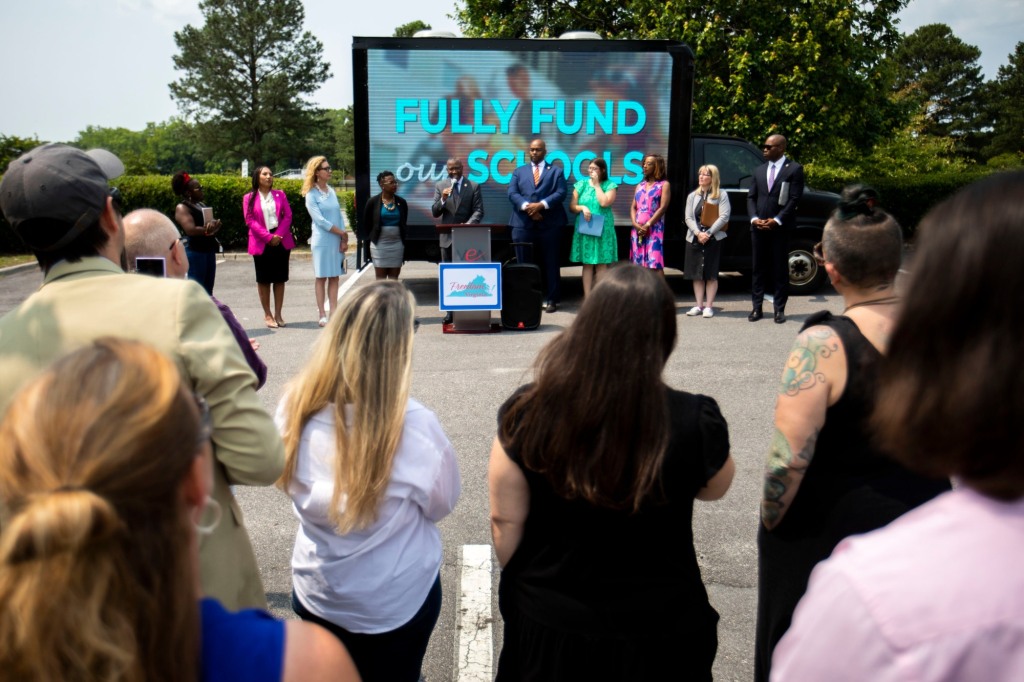Time is running out for Virginia lawmakers to come to an agreement on amendments to the state’s two-year budget plan before the start of the next fiscal year.
School districts will be left in the lurch if legislators can’t reach a compromise by July 1, said Aaron Spence, superintendent of Virginia Beach City Public Schools.
“So much of that funding goes toward teacher compensation so the biggest issue will be uncertainty about whether or not we will be able to pay our teacher contracts,” he said.
During this year’s General Assembly session, legislators debated a series of amendments to last year’s budget plan, including $1 billion in tax cuts proposed by Republican Gov. Glenn Youngkin.
The Republican-controlled House proposed a plan that would enact the governor’s tax cuts, and provide about $383 million for local school divisions. The Democrat-held Senate put forth a plan that would nix the governor’s tax cut package and give about $1 billion to local school divisions.
In recent weeks, both sides have been vocal about the need to reach an agreement, with each advocating for their proposals.
Several Democratic legislators gathered at a rally outside Ebenezer Baptist Church in Virginia Beach last week to speak out against corporate tax cuts and call for more funding for public schools.
“We are at a crossroads,” said House Minority Leader Don Scott. “Do we let the MAGA agenda dictate our path, leading us toward tax handouts to big corporations, or do we invest in schools here in Virginia Beach, Norfolk, Suffolk and Portsmouth? I am proud to stand with our schools.”
Youngkin has called on legislators in recent weeks to wrap up their work.
“Virginians need a budget and the governor has continuously encouraged the General Assembly to reach a resolution,” Youngkin spokesperson Macaulay Porter said in a statement. “As the governor has said, due to Virginia’s surplus of funds we can afford to cut taxes and invest in critical priorities.”
The state passed a two-year budget in 2022 and approved stopgap funding this year, meaning state government will continue to operate without any action. But without it, the state will enter the next fiscal year with a surplus and no framework for what to do with the money.
Spence said he’s fairly confident legislators will reach an agreement before July 1. But he said waiting until the last minute places extra pressure on schools and localities.
For instance, Spence said, if the General Assembly ultimately approves a substantial amount of money for new teachers, but requires a matching contribution from localities, then cities won’t have as long to come up with that funding.
“I think some localities will find themselves scrambling to find those local dollars,” he said. “So there are quite a few issues with waiting this long to get the budget squared away.”
Carol Bauer, vice president of the Virginia Education Association, said the lack of answers on the budget amendments is already causing stress for many educators.
“There is a lot of uncertainty and many are wondering if they want to remain in a system that isn’t supporting the work they are doing,” she said.
The ongoing budget negotiations are headed by House Appropriations Committee Chair Barry Knight and Senate Finance and Appropriations Committee Chair Janet Howell and Co-Chair George Barker. The three legislators largely work behind closed doors, meaning little updates have been available to the public.
Scott, D-Portsmouth, said legislators don’t receive extensive updates either.
“The way it’s done we get some updates but for the most part, it’s a very close to the vest process because there are so many things that can go astray when you are negotiating,” he told The Pilot. “You don’t want to be talking about what’s in the deal and what it looks like until you have a deal on the table.”
Knight, R-Virginia Beach, said last month that budget conferees were meeting every couple of weeks and were getting “smaller things” out of the way. But he said they wouldn’t have a proposal until June because clashes in Congress over the debt ceiling left too many unknowns.
Dave Wesolowski, chief of staff for Barker, D-Alexandria, told The Pilot this week there is no time estimate for when negotiations will conclude.
“At the end of the Legislative Session the two major concerns, shared by Senate Finance and House Appropriations, were the (federal) debt ceiling negotiations and indications of an economic downturn that could effect revenues,” he wrote in an email. “While the former has been taken care of the latter remains a concern … Howell and Barker as well as Chairman Knight believe that the worst thing we can do is adopt a revised budget and then have to immediately come back to make cuts if conditions change.”
Wesolowski said an update will be provided during the Senate Finance and Appropriations Committee’s meeting in Richmond on Tuesday.
Youngkin, who campaigned on a promise to cut taxes, successfully pushed for about $4 billion in tax cuts last year, including repealing the state’s 1.5% sales tax on groceries.
The governor is now pushing to increase the standard income tax deduction for individuals and couples, to lower the corporate tax rate from 6% to 5%, and to remove age requirements so younger veterans could benefit from a law passed last year allowing those 55 or older to deduct from their taxable income tens of thousands of dollars in military retirement pay.
“The governor’s proposal to reduce taxes will make Virginia more competitive with neighboring states, grow Virginia, and reduce the burden on small business owners and Virginians,” Porter wrote.
Democrats have voiced strong opposition to lowering the cooperate tax rate. After the rally, Scott said the state isn’t struggling to bring in new businesses.
“Virginia was able to attract Amazon, recently LEGO and several other large organizations without any tax cuts,” he said. “So why is the governor asking for this now?”
Katie King, [email protected]










